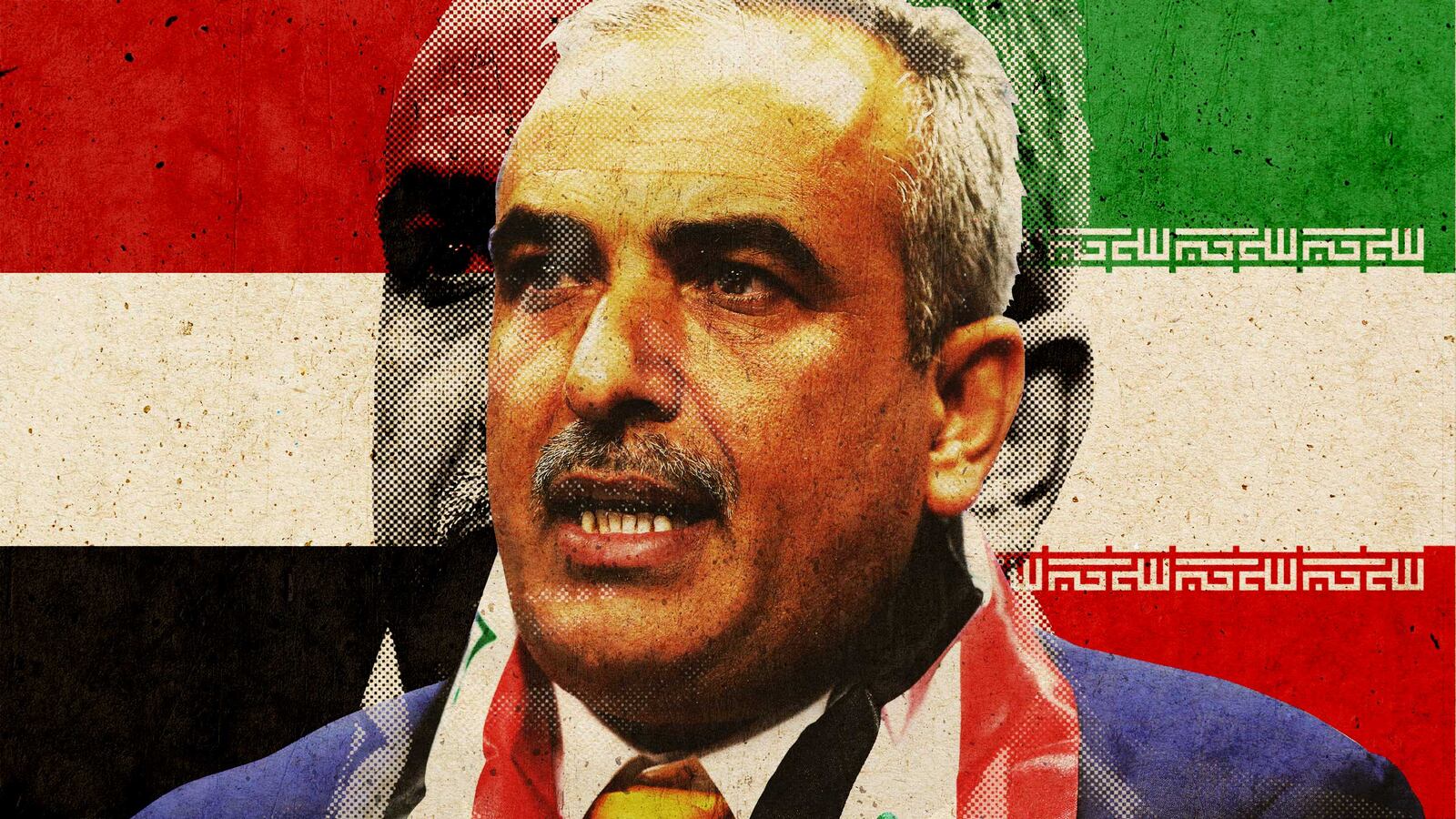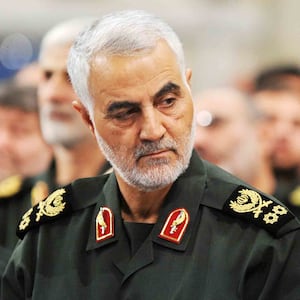Earlier this week, Ahmed al-Jabouri called up Iraqi legislators with a critical request that, his Iranian patrons believed, would seal the deal on a longstanding ambition of Tehran’s: expansive control over the Iraqi government next door.
Known as Abu Mazin, al-Jabouri is considered by Western officials to be among Iran’s favorite Sunni politicians in Iraq. During a frantic period of government formation in Baghdad this week, al-Jabouri implored Sunni parliamentarians from the National Axis Alliance—part of a broader coalition that includes pro-Iranian militias and other Iranian allies—to help stop a longtime pro-American Kurdish leader, Barham Salih, from becoming Iraq’s next president.
“Tomorrow, in the the event of the election of Brother Barham [Salih], the Reform and Construction Coalition will become the larger bloc, and that is wrong,” al-Jabouri urged, in audio reviewed by The Daily Beast.
If al-Jabouri’s interlocutors threw their support to the Kurdistan Democratic Party (KDP) and its candidate for president, Fuad Hussein, “we would announce that we are the larger bloc” in parliament. That way, they could shape the next Iraqi government, including the next prime minister, the most important political position in Iraq. But members of the alliance needed to attend a “very urgent” meeting to put the plan in motion, al-Jabouri said: “If you do not attend, everyone’s rights will be lost.”
Lose they did. On Tuesday, the Iraqi parliament didn’t go for Hussein—it voted for Salih. An hour later, Salih tapped for prime minister a candidate with firm support from Washington: former oil minister Adel Abdel Mehdi. al-Jabouri’s gambit, considered a key step for Iranian hardliners, was thwarted.
“This was Qassem Suleimani’s plan, and it didn’t work,” a senior Western official told The Daily Beast.
That assessment goes against a consensus that has taken hold in Washington. Observing Iraq’s deeply confusing and transactional parliamentary politics, and the grinding way the next Iraqi government has come together, many think Suleimani, the head of the hardline Qods Force within Iran’s Revolutionary Guard Corps, has run the table. “The clear winner is Iran,” Sen. Marco Rubio dejectedly tweeted on Tuesday.
But knowledgeable U.S. and Western officials believe that it’s more complicated than that. Iranian political influence in Iraq is a fact of life, but it’s not determinative, and they’re pointing to the composition of the next Iraqi government as evidence. The next Iraqi government is hardly going to do Washington’s bidding, they tell The Daily Beast, but the U.S. can do business with it. And, they say, the new leadership is short of what Tehran wanted to enforce its own will, particularly considering that the parliament features a strong presence from Iranian allies like ex-prime minister Nouri al-Maliki and the militia commander Hadi al-Ameri.
The speaker of the parliament, decided on Sept. 15, will be Mohammed al-Halbusi. Halbusi who worked with the U.S. military during the 2003-2011 occupation, and again, most recently, as governor of Anbar province. He’s said to support a long-term U.S. military presence in Iraq.
Salih, the former prime minister of Iraqi Kurdistan, didn’t just beat Hussein, he trounced him, with 219 votes to Hussein’s 22. Considered a pragmatic and moderate figure who was key to developing Kurdistan’s oil sector, Salih is particularly close with Washington. Like many Iraqi politicians, he also has ties to Iran, though not to the degree that Americans sweat them.
Adel Abdul Mahdi, Westerners say, is a relief as the next prime minister. He’s a French-trained economist who was willing to work with the U.S. occupation and who got Iraq’s international creditors to cancel the country’s considerable debt. The Americans have favored him for prime minister in the past three elections, to little avail.
Like both Salih and Halbusi, the Iranians can work with Mahdi, but they vastly prefer politicians like Ameri or Faleh Fayyad—a former national security adviser also tight with Iranian-backed militias—for the premiership. Iran’s regional enemies have begun signalling support for the new Iraqi government. King Salman of Saudi Arabia on Wednesday called Mahdi and Salih to offer congratulations.
Both Mahdi and Salih “have real relationships with people from different communities and possess a quality often in short supply in Iraqi politics: the ability to imagine the needs and desires of a political adversary,” wrote Meghan O’Sullivan, a key Iraq policy official during George W. Bush’s administration, who called Tuesday’s government formation “a great day for Iraq.”
A senior Iraqi official saw Mahdi’s elevation as a sign that Iraq, a one-time wealthy nation devastated by generations of tyranny, sanctions and brutal conflict, has a chance for an economic revival.
“There are very few knowledgeable, experienced economists in the upper reaches of the Iraqi government as qualified as Adel Abdul Mahdi,” Fareed Yasseen, the Iraqi ambassador to the United States, told The Daily Beast. “Everyone recognizes the next phase in the recovery of Iraq will depend on reviving the economy, empowering the private sector and bringing about the reconstruction of the country, especially for the areas degraded and neglected because of war.”
Hostilities are rising between the Trump administration and Tehran. And Iraq has been shaping up, once again, as a proxy battlefield between the two enemies—enemies who recently found themselves as uncomfortable allies of convenience against the so-called Islamic State. Rocket and mortar attacks on U.S. diplomatic installations in Baghdad and Basra led Secretary of State Mike Pompeo to close the Basra consulate last week. This week, Pompeo suggested that more violence is to come: “We must be prepared for them to continue their attempts to hit back, especially after our full sanctions are re-imposed on the 4th of November.”
An Iranian government representative did not answer questions about al-Jabouri's gambit but offered similar praise for the new Iraqi government.
"We congratulate President Salih on his election and Mr. Abdul Mahdi on being tapped to form a cabinet. We obviously cannot comment on political dealings in Iraqi politics, but we have always had a positive relationship with both Mr. Salih and Mr. Abdul Mahdi in furtherance of the goal of Iraq being a free, sovereign, and united nation," said Alireza Miryousefi, head of the press office of the Iranian mission to the United Nations. "We look forward to working with them and our other partners in the Iraqi government and security forces in furtherance of the aspirations of the Iraqi people and our two nations' strong political, social and cultural relations."
The past 15 years of bitter, bloody experience ought to have broken American policymakers of their hubristic belief that they can control the course of events in Iraq. No Westerner interviewed by The Daily Beast considered the new government perfectly convivial to U.S. interests, nor do they consider Iranian influence in Iraq thwarted. But “the net result” of the final, furious round of parliamentary politicking, said the senior Western official, “is the most pro-Western trio of leaders in the top three positions that Iraq has ever had.”






